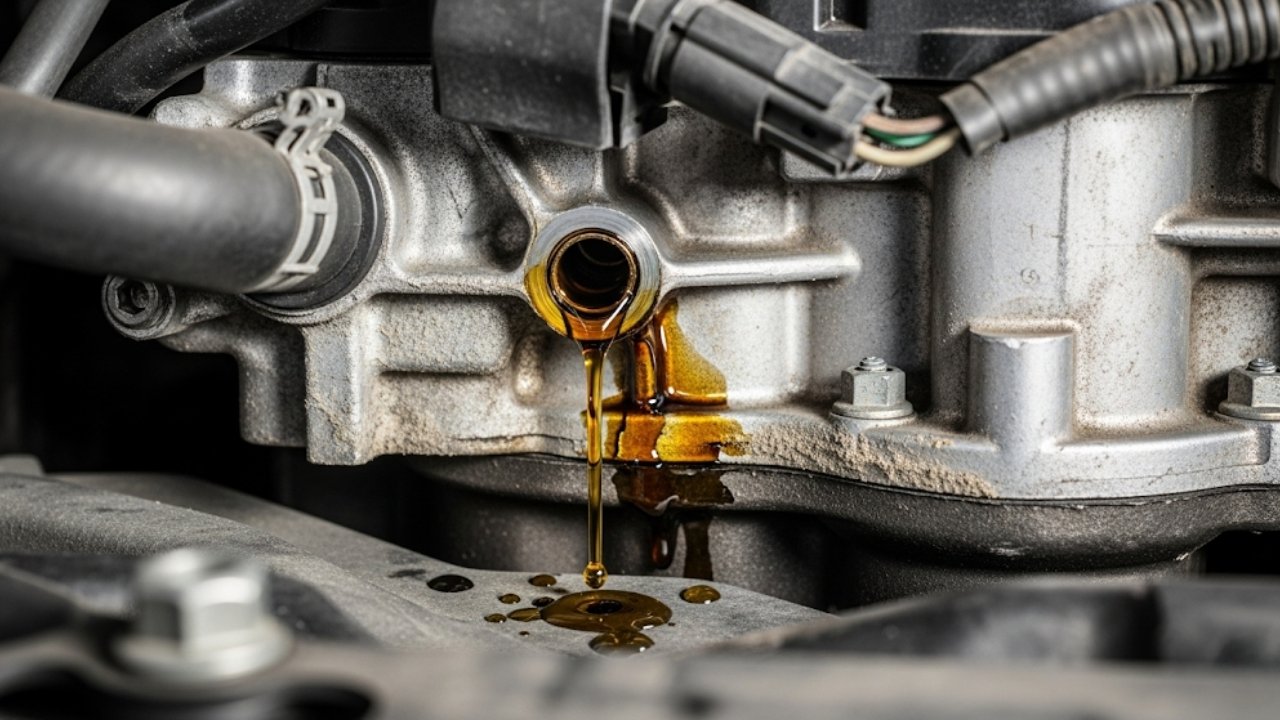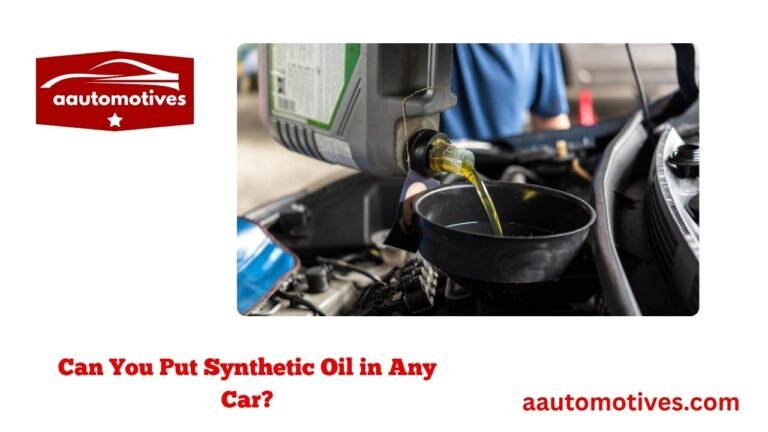Small Oil Leak in Car: What It Means

We’ve all been there. You’re leaving your driveway or a parking lot, and you spot a little dark puddle under your car. At first, you brush it off — maybe it’s water from the A/C, right? But then it happens again. That’s when the panic sets in, and you start wondering, “Do I have a small oil leak in my car?”
Let me tell you — I’ve been through this exact situation. And while a small oil leak might not seem urgent, it’s like a ticking time bomb for your engine if ignored. Cars are like people. They can function with small problems for a while, but if those problems go unchecked, they grow into much bigger issues.
In this guide, I’ll walk you through everything I learned — the causes, signs, solutions, and real consequences of ignoring a small oil leak in a car. Whether you’re a first-time driver or a seasoned gearhead, this article has something for you.
What Exactly Is a Small Oil Leak in a Car?

Oil is the lifeblood of your engine. It keeps everything lubricated and prevents overheating. So when oil leaks out, friction builds up, parts wear down, and the engine gets hotter than it should. It’s like jogging without water — doable for a while, but dangerous long-term.
Here’s what usually causes these leaks:
-
Worn-out valve cover gaskets
-
Loose oil pan bolts
-
Aged or cracked seals
-
Improperly tightened oil filters
-
Damaged oil pans from road debris
A small oil leak might just leave a few drops under your car. But even a small leak can lead to low oil levels and possible engine failure if you don’t address it early.
The Telltale Signs of a Small Oil Leak
Catching a small oil leak in a car early can save you a lot of money and headaches. But the signs can be subtle — like a whisper instead of a scream. Here’s how I first noticed something was off with mine:
I parked my car overnight, and the next morning there was a dime-sized dark spot on the driveway. I ignored it for a few days until I noticed more spots — and a faint burnt smell after longer drives.
If you notice any of these symptoms, you could be dealing with a small oil leak:
-
Oil spots on your driveway or garage floor
-
Burning oil smell, especially after driving
-
Low oil levels even though you haven’t driven much
-
Smoke from the engine bay
-
Dashboard oil warning light
Noticing just one of these signs might not confirm a leak. But if you see two or more? That’s your car asking for help.
Common Causes of a Small Oil Leak in a Car
Understanding the why helps fix the what. Let’s look deeper into what actually causes a small oil leak in a car. In my case, it turned out to be a $10 gasket. But some problems can be much more complex.
Here’s a quick breakdown:
| Cause | Description | Severity if Ignored |
|---|---|---|
| Valve Cover Gasket | Seals the top of the engine. Can wear over time. | Moderate. Oil drips slowly. |
| Oil Pan Gasket | Seals the oil pan to the engine. Can break from impact or wear. | High. Can cause serious leakage. |
| Crankshaft Seal | Found at both ends of the crankshaft. Wears with age. | High. Often requires engine disassembly. |
| Timing Cover Leak | Seal around the timing belt cover. | Moderate. Can lead to contamination of belt. |
| Improper Oil Change | Filter or plug not tightened correctly. | Low to Moderate. Easy to fix. |
Pro tip: A flashlight and some old clothes go a long way when inspecting your engine for leaks. Start by checking the oil pan area and valve cover — those are the most common culprits.
Is It Safe to Drive With a Small Oil Leak?
Let me answer this with a story.
Last year, my friend Reza had a small oil leak in his old Toyota. He kept topping off the oil and delaying repairs. Three months later, he was stranded on the highway with a seized engine. What started as a minor drip turned into a $2,500 engine rebuild.
So, is it safe to drive?
-
Short-term? Maybe. If it’s truly small, you might get away with it for a few days.
-
Long-term? Absolutely not. Oil leaks never fix themselves. They get worse, and they can put you — and your engine — at risk.
Here’s what driving with an oil leak can lead to:
-
Overheating the engine
-
Worn-out components due to lack of lubrication
-
Fire risk if oil hits hot parts
-
Environmental harm from leaking oil
Bottom line: If you know there’s a small oil leak in your car, schedule a check-up ASAP. Prevention is cheaper than repair.
DIY or Mechanic: What’s the Best Route?
Here’s where it gets practical.
Some folks like to get their hands dirty (literally), while others prefer handing over the keys and letting a mechanic take care of things. So how do you decide?
Ask yourself these questions:
-
Do you have basic tools and a safe place to work?
-
Can you identify where the leak is coming from?
-
Are you okay getting under the car?
-
Is the leak coming from an easy-to-reach spot like the oil filter or valve cover?
DIY Fixes That Work:
-
Tighten the oil filter or drain plug
-
Replace a gasket (like the valve cover one)
-
Use stop-leak additives (temporary only!)
-
Clean the area, then monitor for recurring leaks
But if the oil seems to be coming from deep within the engine — crankshaft seals, rear main seal, etc. — then it’s time to visit a professional.
I tried replacing a gasket once and ended up covered in oil. My advice? Know your limits. Your car — and your sanity — will thank you.
Preventing Future Oil Leaks
Once you’ve fixed a small oil leak in a car, the next step is making sure it never happens again. Like brushing your teeth to avoid cavities, small actions now can save big headaches later.
Here’s what I personally do (and recommend to friends):
-
Change your oil on time — use high-quality oil and filters.
-
Inspect seals and gaskets during regular services.
-
Tighten bolts to the right torque — not too loose, not too tight.
-
Avoid rough driving over potholes or speed bumps that can damage the oil pan.
-
Keep your engine clean so you can easily spot new leaks.
These small steps help you stay ahead of problems. Think of them as a car care routine — like a skincare routine, but with more grease.
Home Remedies vs. Auto Repair Shops: What’s Better for a Small Oil Leak in a Car?
Now, let’s break down your options. Should you try to fix the small oil leak in your car at home or let the pros handle it?
Honestly, it depends on where the leak is and how confident you are.
Home Remedies:
If the issue is something like a loose oil drain plug or a leaking valve cover gasket, you can definitely fix it at home. I’ve done this with nothing more than a wrench, a new gasket, and YouTube.
Here’s what works for home mechanics:
-
Stop-leak oil additives: These temporarily swell rubber seals to slow leaks.
-
Tightening bolts: Just don’t overdo it — you could strip the threads.
-
Replacing small gaskets: Valve cover and oil filter gaskets are the most manageable.
-
Monitoring the oil level daily: Just to be safe after any DIY repair.
But remember — some of these are temporary fixes, like putting a band-aid on a small cut. They’ll hold for a while, but eventually, you need a real repair.
️ Auto Repair Shops:
If the leak comes from hard-to-reach parts like the rear main seal or timing cover, don’t risk it. These require engine disassembly, lifts, and torque specifications.
A trusted mechanic will:
-
Diagnose the exact leak source using UV dye or pressure tests
-
Provide a lasting repair, not just a patch
-
Ensure no hidden damage from oil contamination
-
Offer warranty or guarantees on their work
I once tried fixing a crankshaft seal myself. Two days later, I was back at the mechanic with more leaks and oily jeans. Lesson learned: sometimes it’s cheaper to go pro.
What’s the Real Cost of Fixing a Small Oil Leak?
Let’s talk money. One of the reasons people delay fixing a small oil leak in a car is cost fear. I get it. Car repairs aren’t cheap. But here’s the truth — the longer you wait, the worse (and costlier) it gets.
Here’s a rough breakdown of common repair costs in USD:
| Leak Source | DIY Cost | Mechanic Cost |
|---|---|---|
| Valve Cover Gasket | $20 – $50 | $150 – $300 |
| Oil Filter or Drain Plug | $5 – $15 | $50 – $100 |
| Oil Pan Gasket | $25 – $75 | $250 – $600 |
| Rear Main Seal | N/A (not DIY-safe) | $500 – $1,200 |
| Stop-Leak Additives | $10 – $30 | N/A (DIY only) |
Pro Tip: Don’t shop by price alone. Shop by trust and reviews. A mechanic who charges a bit more but does it right the first time is better than one who cuts corners.
And remember, letting a small oil leak go unchecked could lead to engine replacement — which easily costs $3,000 to $6,000. Fix it early, fix it smart.
Comparing Oil Stop-Leak Additives
Some drivers swear by stop-leak products. Others call them snake oil. I’ve used them once or twice, and they worked temporarily — great as a stop-gap when you’re saving up for real repairs.
Here’s a comparison to help you choose wisely:
| Brand | Works On | Duration | Price Range | Best For |
|---|---|---|---|---|
| BlueDevil Oil Stop Leak | Rubber seals and gaskets | 3–6 months | $15 – $25 | Older cars with minor leaks |
| Bar’s Leaks | Minor leaks | 1–3 months | $5 – $15 | Emergency situations |
| Lucas Oil Stop Leak | Leaks from engine and seals | 2–4 months | $10 – $20 | Preventive use after service |
| ATP AT-205 Re-Seal | All rubber gaskets | 3–6 months | $10 – $18 | Safe and chemical-free option |
Always follow directions carefully, and never use more than recommended. And don’t expect these to work on metal cracks or huge leaks. They’re best for small oil leaks in a car where the seals are just starting to wear.
Final Checklist: What to Do If You Notice a Small Oil Leak
Here’s a quick and handy checklist you can follow the moment you suspect a small oil leak:
✅ Park on a clean surface and look for oil spots
✅ Check your oil dipstick level regularly
✅ Inspect the engine bay with a flashlight
✅ Clean suspected leak areas to track fresh oil
✅ Use stop-leak additive as a temporary fix
✅ Schedule an inspection if leak persists
✅ Get a second opinion for expensive repairs
✅ Don’t ignore dashboard oil warning lights
Keep this checklist on your phone or glovebox. When you act quickly, you’re saving your car’s future.
FAQs About Small Oil Leak in Car
1. How serious is a small oil leak in a car?
It might not be urgent at first, but over time, even a small leak can lead to low oil levels, engine damage, and expensive repairs. It’s best to fix it early.
2. Can a small oil leak fix itself?
Unfortunately, no. Once a gasket or seal starts leaking, it won’t heal on its own. You might slow it with additives, but it requires repair for a permanent fix.
3. Can I drive my car with a small oil leak?
In the short term, yes — especially if the oil level stays stable. But long-term driving with a leak risks engine failure, overheating, and even fire hazards.
4. How can I find where the oil is leaking from?
Start with a visual inspection under the hood. Clean the area and check again after a short drive. Mechanics may use UV dye tests to pinpoint leaks more precisely.
5. Does oil leak affect fuel economy?
Not directly. But over time, the strain on the engine from low oil can reduce efficiency and increase wear on engine parts.
6. Will an oil leak fail my inspection or emissions test?
Yes. Some states or countries consider oil leaks a safety or environmental issue, and your vehicle can fail inspection.
7. How long does it take to fix a small oil leak?
Minor gasket replacements take about 1–3 hours. Major ones like a rear main seal may take a full day or more due to labor-intensive engine work.
8. Can oil leaks cause a fire?
Yes. If leaking oil drips onto hot engine components like the exhaust manifold, it can ignite. That’s why even a small oil leak should be taken seriously.
Conclusion: Small Leak, Big Lessons
If there’s one thing I’ve learned over years of owning cars, it’s that the little things matter. A small oil leak in a car might not seem like a big deal today — just a few drops, a faint smell, a small stain. But over time, it adds up.
Just like ignoring a slight toothache leads to a root canal, ignoring that drip could end with a fried engine. Trust me — I’ve been there, and it wasn’t cheap.
The key is to pay attention early, act fast, and never take your car’s signals lightly. Cars are tough machines, but they still need TLC — and a little empathy from the person behind the wheel.
So the next time you spot an oil stain in the driveway or catch a whiff of something burnt, don’t brush it off. Listen to your car. It’s speaking your language — you just have to tune in.






